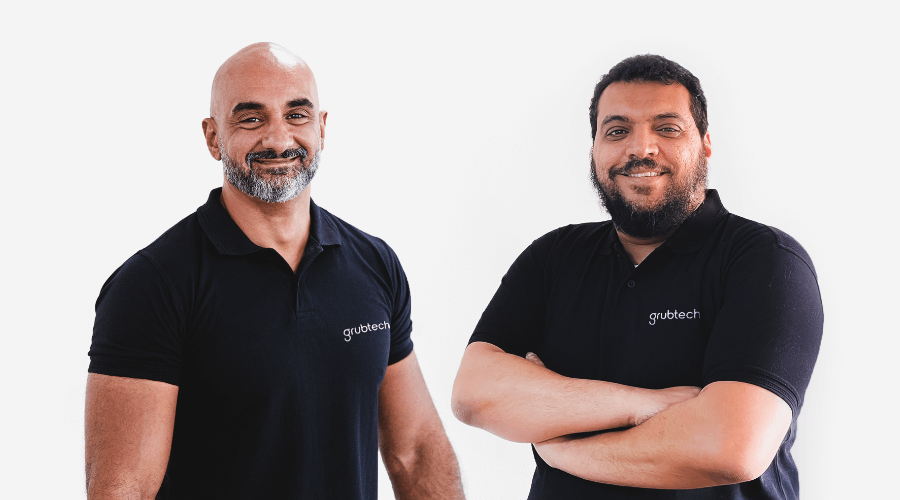Why is Grubtech shifting its focus to Egypt?

The foodtech space remains one of the most dynamic in the Middle East, thanks to the region’s insatiable appetite for food delivery and eating out. Last year, foodtech startups across Mena raised over $896 million, about 28 per cent of the $3.17 billion raised in total. These startups ranged from cloud kitchens and food ordering platforms to POS systems.
While diners have embraced eating out since the end of lockdowns, food delivery has not waned. This has sparked demand for all-in-one software solutions from restaurant operators, to allow for quick updates based on the business' changing needs.
One startup offering such a solution is Grubtech, founded by Mohamed Al Fayed, Mohamed Hamedi and Omar Rifai, in 2019 as cloud kitchens were beginning to take hold in the UAE in particular. Grubtech’s solution focuses solely on fulfilling the needs of delivery-oriented virtual and hybrid restaurants, offering a full suite of end-to-end services such as software, third party integration and payment solutions. The technology offered by Grubtech cuts across several touchpoints in the supply chain, helping restaurant owners better manage their inventory, reduce wastage and increase labour utilisation. It claims that its solution helps expedite the order delivery cycle by 25 per cent, saving its clients up to 15 per cent of their gross payroll.
Grubtech currently serves customers in 18 countries across different regions, with the GCC being its biggest market. Earlier in May, the company expanded to Egypt, and relocated its entire back office functions to Cairo to serve its clients from all over the world. This came a year after it raised a $13 million Seed round.
"We had tremendous success in Pakistan, a country that operates very much like the Egyptian market. We're taking this knowledge, packaging it and localising it to the local market. We have a dedicated team that educates the restaurant community from [a] technology perspective and we work constantly on pricing and bundling our product in a way that makes it attractive for the restaurants to adopt," says Al Fayed.
But it is not just the market opportunity in Egypt that has driven Grubtech’s pivot to the country. The main reason is gaining access to a wider pool of talent.
“[Egypt] boasts abundant yet affordable talent, which can otherwise be difficult to find in the GCC, especially amid the current push towards nationalisation of the workforce adopted by governments across the region," says Osama Harfoush, country manager at Grubtech
Grubtech is the second regionally-based restaurant-focused SaaS startup to expand to Egypt after Saudi Arabia-based Foodics, which announced its foray into the Egyptian market back in 2020.
Online versus offline food delivery
Given the majority of food delivery orders in Egypt are placed through offline channels, the potential of e-commerce in the food delivery market remains largely untapped. Riding on the opportunity, Grubtech looks to win over restaurants seeking to expand their delivery footprint as well as bring about the parity between online and offline delivery.
"Around 80 per cent of the food consumed in Egypt is coming from deliveries placed offline. [We] firmly believe that consumer behaviour is going to change and shift to digital versus analogue, as it happens in a large market like Egypt where we estimate our addressable market is more than 40,000 restaurants," says Al Fayed.
Our initial stages of discovery showed that the large restaurants that we are targeting are using a very archaic technology, which causes a dent in their entire operations. The large multi-channel brands have exasperated challenges because they use central kitchens and stores for deliveries. We have a full team that trains the restaurants on not just the technology, but how to use the technology effectively in their operations," he further adds.
The offline-to-online conversion rates have been on an upwards trend thanks to a surge in popularity and use of food aggregators and a rise in digital payments options.
Despite being a "winner takes it all'' market, the food delivery sector has long been on the radar of global players. Turkey-based q-commerce and courier services provider Getir and UK-based online delivery platform Deliveroo, had reportedly made plans to enter the Egyptian market, but these plans were shelved due to the ongoing economic crisis, perhaps indefinitely.
"[Food aggregators] are going to educate and improve the customer experience on the mobile digital channel to shift from calling the number of the restaurant to order and placing it directly on the application. Sometimes, brands are not willing to collaborate with food aggregators and lean on third-party logistics for delivery. We help them do that through our automated solution. In general, local brands are increasingly becoming aware of the significance of having a robust digital presence, " Harfoush elucidates.
While the demand is mostly seen in the big cities of Cairo and Alexanderia, the online food delivery services are increasingly taking hold in the smaller cities of Egypt. From there, the cloud kitchens serve a huge role in enabling restaurant owners to roll out into new geographies without incurring the hefty expenses of setup.
The change in consumer behaviour and the brand owners' growing need to switch to more digital ways of communications are key factors facilitating Grubtech’s smooth market entry.
"The cloud kitchens segment is gaining ground among local brands, and it is growing at least at a convincing pace. Unlike in the past, the market now boasts a handful of cloud kitchen operators, owing to the obvious pumped up demand for delivery services," Harfoush adds.


